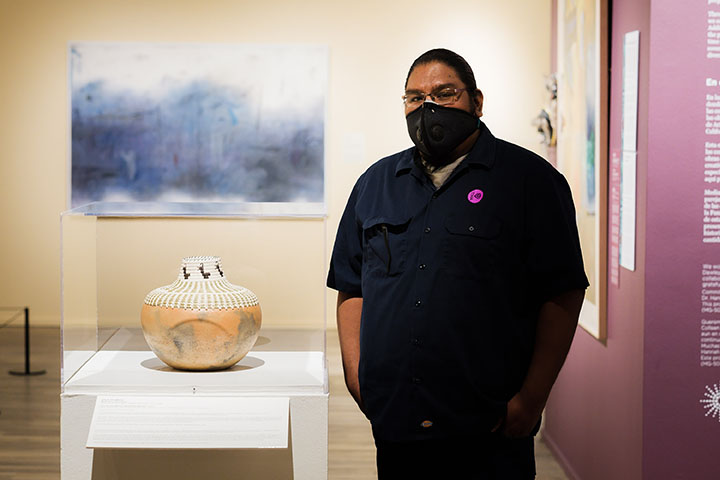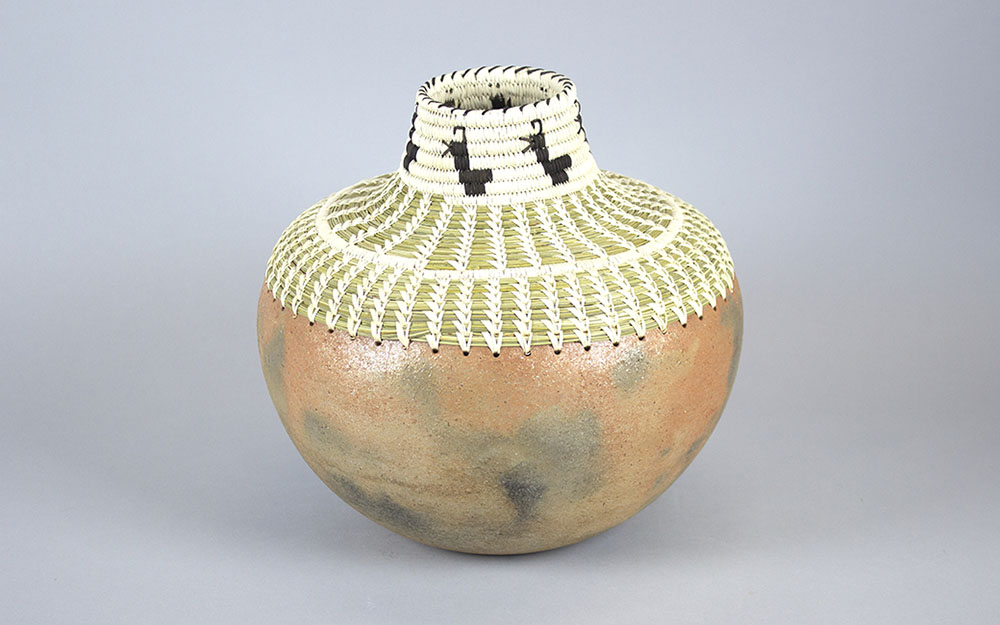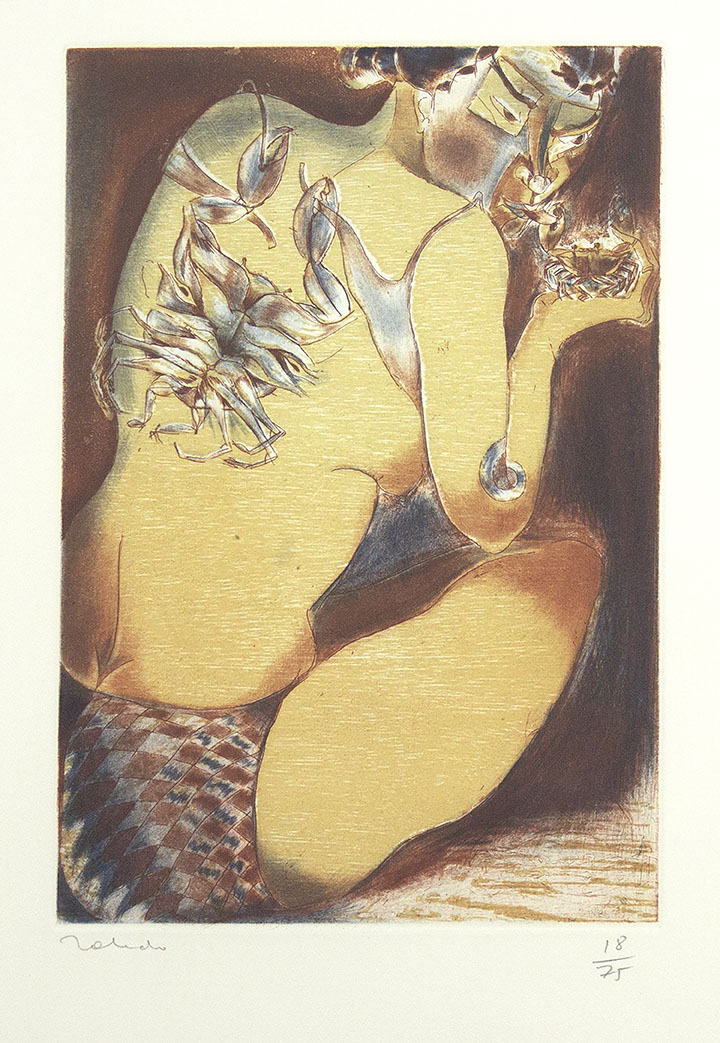Spotlight on Three New Acquisitions

Harrison Preston created Across Traditions: Quail Storage Jar specifically for TMA’s reinstalled Indigenous Arts Gallery, which opened in March 2021. It was accessioned by the museum in May.
TMA’s permanent collection is constantly growing. The museum acquires and receives acquisitions of art throughout the year through the generosity of its members, artists and other collectors from around the country, as well as museum purchases.
Numbering more than 10,000 objects, the TMA collection includes five principal collections (Art of the American West, Contemporary Art, Indigenous Arts, Latin American Art and Modern Art) plus special holdings (Asian Art, Decorative Arts, European Art and the Historic Properties).
Stay tuned to the weekly TMa-list newsletter and this site for future updates on the collection and the development of a Collecting Plan (to launch this fall) that will align with the museum’s mission, vision and IDEA Plan. It will outline the museum’s core collecting areas, methods, and tools to refine the existing collection. This forthcoming document will help TMA to prepare for the future as we work to redefine and refine our collection with a focus on and commitment to the cultures and region of the Southwest, and as a reflection of global art movements.
Here is a look at three of the artworks acquired by TMA in the first half of 2021.

Harrison Preston, Across Traditions: Quail Storage Jar, 2021, yucca, devil’s claw, beargass, micaceous clay. Collection of the Tucson Museum of Art. Museum Purchase. Funds provided by Jeremy Mikolajczak and Ana Tello. 2021.12
HARRISON PRESTON
Across Traditions: Quail Storage Jar
Harrison Preston, a Wa:k O’odham artist, is a basket weaver and potter. His hybrid pieces, which consist of one part woven grasses and one part clay vessel using local materials, blend two significant art forms of the O’odham into a singular work of art. The new acquisition, Across Traditions, was created especially for display in TMA’s Indigenous Arts Gallery.
Preston says of the piece: “Across Traditions is the name I’ve given this series of work, which combines Tohono O’odham basketry and pottery. As a Wa:k O’odham craftsman, I am always experimenting on ways to push O’odham crafts forward, all the while trying to preserve and respect the traditions therein.
“I see these pieces not only as a kind of self-portrait, as I am a craftsman of both mediums, but also representative of the desert where I live, the earth below and the plants and life above. The Micaceous clay base is created by traditional methods before being pit fired outdoors, which produces the fire clouds on the exterior surface. The basket fibers are collected or grown throughout the year then need to be processed and dried before storage and use. In the past few years, I’ve chosen to use quail designs in my work, as a reminder of my grandparents who would await the reemergence of the quail in springtime.”

Vanessa German, We Hold These Truths To Be Self-Evident, 2020, mixed-media assemblage. Collection of the Tucson Museum of Art. Museum Purchase. Funds provided by Jane Leonard. 2021.16
VANESSA GERMAN
We Hold These Truths To Be Self-Evident
Vanessa German is a multi-disciplinary artist and activist based in Pittsburgh, Pennsylvania. Drawing on her experience of living in the Homewood neighborhood, German creates her work in response to the systemic institutionalized racism, violence and brutality facing the community. German explores the power of transformation and healing through her bold mixed-media assemblages.
We Hold These Truths To Be Self-Evident is from a series of altarpieces created as a spiritual and revelatory act. This work is an altar to Aunt Jemima and her retirement, which was publicly announced in February 2021. The central vintage doll of Aunt Jemima is framed by the words “RETIRED” and “YES,” as well as by small bronzed alligators, historically used in racist imagery, but now restored to majestic creatures in a place of honor and dignity.

Francisco Toledo, Mujer de Juchitán, 1985, etching, drypoint, woodcut, 18/75. Collection of the Tucson Museum of Art. Gift from the Mary and Hal Douthit Collection. 2021.7.17
FRANCISCO TOLEDO
Mujer de Juchitán
Francisco Toledo (1940–2019) has long been regarded as one of the most well-recognized artists of 20th and 21st-century Mexico. A fierce advocate for the city of Oaxaca and its artists, as well as a champion of the Indigenous traditions of that region, Toledo’s work offers sensuous — and often sensual — takes on stories from Mesoamerican tradition. TMA was fortunate to receive a donation of 28 works on paper by the artist, including watercolor paintings and lithographs, from the Mary and Hal Douthit collection. Previously shown in museum exhibitions in the Midwest, TMA is honored to now care for these works as part of the institution’s collection of Latin American Art.
The print shown above offers an example of the kinds of images that Toledo created in the 1960s and 1970s, when many of the works given to TMA were created. The piece is titled Mujer de Juchitán — or “Woman from Juchitán” — and it refers to a region of the southern part of Oaxaca state known for its rich Indigenous traditions and matriarchal societies. Perhaps most striking in this image is the body of a crab depicted across the woman’s back — an element that suggests that the scene could be inspired by a Mesoamerican myth or a fable. Indeed, Toledo’s work is often closely tied to storytelling and poetry — an aspect of the artist’s thinking that visitors will be able to enjoy thanks to the generous gift of these works to the collection.
Hours
Museum Hours:
Wednesday – Sunday,
10 am – 5 pm
Information
Newsletter
"*" indicates required fields


